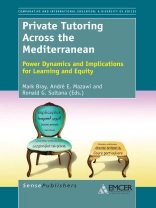Private tutoring—supplementary, out-of-school instruction offered at a fee to individuals or groups—represents a substantial household expenditure, even in systems that claim to have free public education. It plays out across, alongside, and even within some school systems. Emerging as a ‘shadow education’, private tutoring now operates as a system and industry crossing national, regional, and social-class boundaries. Private tutoring is provided through different modes of delivery including the internet. Policy makers, parents, teachers, trade unions, corporations, community associations, and students are implicated in the private tutoring industry. The debates over private tutoring are therefore part of the larger struggles over the ends of education in just and equitable societies. The authors in this volume address diverse national settings of private tutoring across the Mediterranean, and examine its political, economic, social, and cultural underpinnings. They draw on a range of conceptual frameworks, and deploy a variety of research methods to problematize the multifaceted relationships between tutoring, learning, and equity. The volume captures a multiplicity of voices, and focuses on some of the central challenges facing education in pluralistic societies
Tabela de Conteúdo
Chapter 1: Introduction: Situating Private Tutoring; Chapter 2: Private Tutoring and Social Equity in Croatia and Bosnia & Herzegovina: A Comparative Qualitative Study; Chapter 3: Charting Private Tutoring in Cyprus: A Socio-Demographic Perspective; Chapter 4: Education ‘Home Delivery’ in Egypt: Private Tutoring and Social Stratification; Chapter 5: Education as a Market in France: Forms and Stakes of Private Tutoring; Chapter 6: Shadow Education in Greece: Characteristics, Consequences and Eradication Efforts; Chapter 7: Private Tutoring in Italy: Shadow Education in a Changing Context; Chapter 8: The Private Tuition Phenomenon in Malta: Moving toward a Fairer Education System; Chapter 9: Private Tutoring in Portugal: Patterns and Impact at Different Levels of Education; Chapter 10: Constructions of Private Tutoring in Slovenian Online Chatrooms: A Content Analysis; Chapter 11: Private Tutoring and Inequitable Opportunities in Turkey: Challenges and Policy Implications; Chapter 12: The Demand for Private Tutoring in Turkey: Unintended Consequences of Curriculum Reform; Chapter 13: Beyond Shadows: Equity, Diversity, and Private Tutoring; About the Authors.












